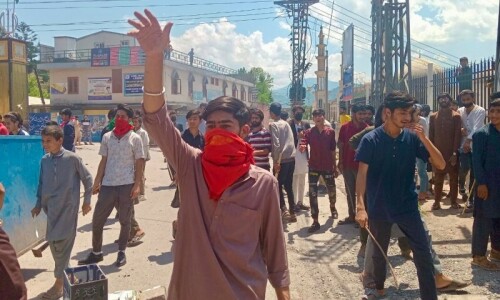THE United Producers Association (UPA), a body of local TV soap opera producers, is protesting against the airing of foreign soap operas at prime time in Pakistan. After the success of a Turkish soap opera, Pakistani entertainment channels shelved a dozen of ongoing local TV serials and purchased a number of Turkish dramas.
Fearing a financial loss, the UPA is protesting and demanding a ban on the foreign entertainment content. Along with the other reasons, the UPA is terming this trend a threat to Pakistani culture and values.
The Senate’s Standing Committee on Information and Broadcasting raised its concern over the cultural values of the foreign soap operas.
The UPA and other bodies are trying to convert an economic issue into a cultural and Islamic one. In my opinion, dangerous battlegrounds are being drawn. On religious, cultural grounds, right - wing religious political parties will hijack the issue, in a society vulnerable to fundamental ideas.
The demand for a ban on cultural products is not a new phenomenon. After the Marshall Plan, import duties on Hollywood movies were softened in France and other Western European countries. Moreover, 20 per cent of screen time had been given to Hollywood movies.
In the late 1960s, French directors and producers protested against the policy and forced the government to review its policy.
In 1955, W.Z. Ahmad and Lollywood directors, producers and actors started ‘jaal agitation’ and demanded a ban on Indian films. The demand was made only on economic grounds, not religious and cultural.
The UPA should also fight its battle on economic grounds rather than religious and cultural ones. The producer should also try to compete in the international market by maintaining the high standard of their cultural products.
Like other import goods, Pakistan should also impose duties on the import of cultural products. Any protest or ban on foreign cultural products on the basis of culture and religion will leave a bad impression on the image of Pakistan.
AAMIR RAZA Islamabad
Foreign culture
ARTISTES, producers and many others who are engaged with the drama industry, directly or indirectly, have now come out of their deep slumber all of a sudden and are protesting against foreign contents.
My question, to them all, is: why did they all suddenly stand against the foreign content? According to my knowledge, the foreign content is not new for our channels because before these Turkish and Spanish soaps, Indian content has been frequently on the air on Pakistani TV channels. Even a few years ago some of our Pakistani producers started casting Indian actors in their dramas.
Now suddenly everyone is against the foreign content. My question to them is, why are they against the Turkish and the Spanish content only and not against the Indian content? Is their protest only about the foreign content telecast on prime time? Why didn’t they take any steps when the foreign content was on air on Pakistani TV channels earlier? However, the authorities concerned should ban all such content which affects our culture and economy.
QURATUL AIN ALI Karachi









































